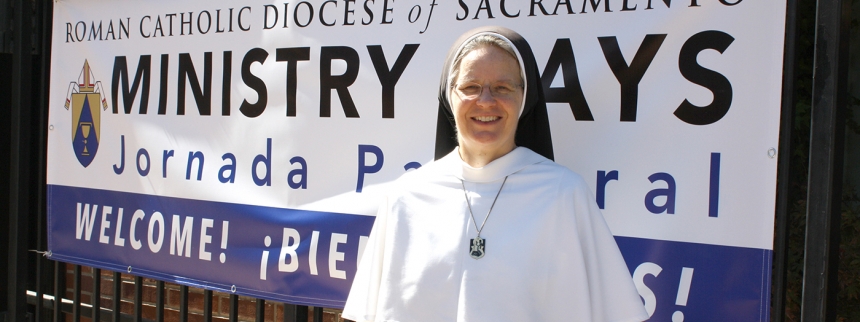
Dominican Sister John Dominic Rasmussen, a foundress of the Dominican Sisters of Mary, Mother of the Eucharist, in Ann Arbor, Mich., has been involved in Catholic education as a teacher and administrator for more than 30 years, working with catechesis and developing curriculum.
From her experience, including as principal of Spiritus Sanctus Academy in Ann Arbor for 20 years, and in dialogue with other teachers, she developed “Disciple of Christ – Education in Virtue,” a Christian curriculum structured on the teachings of St. Thomas Aquinas regarding the virtues and gifts of the Holy Spirit. It was launched at the academy in 2013 and has been highly successful ever since. The virtues program was developed after she noticed a need for teaching young people how to live virtuously from a Catholic-Christian perspective.
Sister John Dominic holds a bachelor’s degree in education from Belmont University in Nashville and a master’s degree in theology from the Franciscan University of Steubenville. She spoke with Catholic Herald magazine while in Sacramento as a speaker during the recent Ministry Days.
The virtues curriculum was developed in response to the call for a “new evangelization,” firmly conveying the reality that happiness is found in a life of holiness, she says.
The program fits right into the Dominican tradition of education. “In keeping with the charism of our order, our apostolate includes teaching and preaching,” she notes. “For centuries, Dominicans have furthered the teachings on the virtues and gifts of the Holy Spirit. ‘Disciple of Christ -- Education in Virtue’ draws upon these teachings and provides the language and resources needed to make it accessible and understandable for educators. It’s practical for anyone to use.”
What does it mean to be a disciple of Christ? To live virtuously as a disciple of Christ, one must first know him, because this relationship gives life purpose and meaning, Sister John Dominic notes.
Despite the secular culture dismissing Christian virtues such as temperance, fortitude, justice and courage, or replacing them with the bland “being nice,” the virtues are essential and important, Sister John Dominic says. “They are so much a part of St. Thomas Aquinas’ teaching. You’re formed in goodness and have this interior disposition to do what is good. This habit of thinking and acting becomes natural. We need temperance, prudence, fortitude, justice.”
Sister John Dominic saw the fruit of learning the virtues many times over in various school situations. For example, if students were sent to her office after making a “bad decision” that resulted in bad behavior, she put saints’ cards from the virtue program in front of them and told them to consider self-control, circumspection and foresight. Then she asked which one they should have practiced to avoid doing what they did.
“I let them decide,” she says. “They’d surprise me and pick out circumspection, and they owned it. It helps the conversation.”
Generally with the older students, she would say, “I know you know to respect your teacher. What is it you need to do to not act up in class? They would say to me, ‘I need fortitude and courage to do the right thing.’ They also realize they need foresight not to sit next to other students they get into trouble with while in the classroom.”
The result, she says, is that students “not only begin to learn the virtues, but to apply them to situations in their lives.”
Eventually, “you have a true interior freedom that helps you make decisions, not because you want to follow a rule book, but because you are striving toward goodness and you want to live this way.”
LEARN MORE
About “Disciple of Christ -- Education in Virtue,” at www.EducationInVirtue.com.

